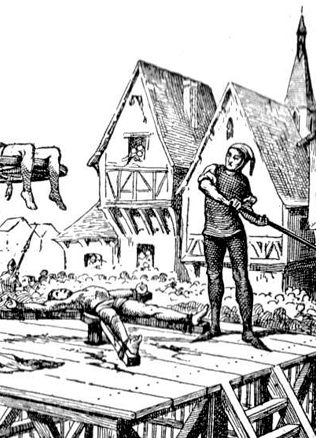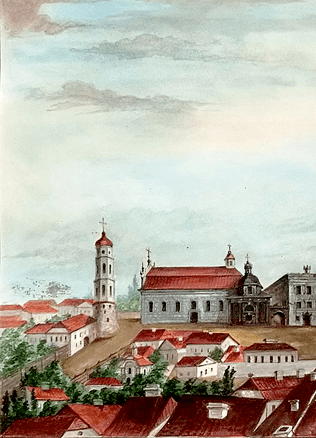The Fight Waged by Pedro Ruiz de Moros against the Faults and Prejudices of his Contemporaries
Pedro Ruiz de Moros (around 1505–1571) is the only poet of Spanish descent active during the Lithuanian Renaissance. Having completed the studies of law in Italy, he was ordained as a minister of a lower rank in a young age. Shortly afterwards, he was invited to teach at Krakow university. However, he soon found his work too poorly paid and lacking any prospects. Therefore, Pedro Ruiz de Moros established contacts with the ruler’s court. Upon the death of Sigismund the Old, he was appointed legal advisor to Sigismund Augustus, and was soon admitted to the circle of people closest to the King. Together with the Ruler’s Court he moved to Vilnius in 1551 or 1552 and stayed here until his death. Pedro Ruiz de Moros was regarded by his contemporaries and the ruler as a competent and authoritative lawyer, respected for his contribution during the preparation of the II Lithuanian Statute of the Grand Duchy of Lithuania. He also published a significant legal treatise on the decisions made by the King’s Court. Pedro Ruiz de Moros was granted by Sigismund Augustus ecclesiastical positions which generated significant income (Dean of the Kražiai Church, later Dean of St. John’s church in Vilnius). Pedro Ruiz de Moros was a regular court poet. He created verse in Latin about the changes in the lives of the king and influential nobility (such as the marriages, appointment to a new position, bereavement, etc.) as well as about the significant events at the state level (conclusion of the Lublin Union, victories achieved during the Livonian war). As a response to the spread of Protestantism, he wrote a poem Chiliastichon in 1557, in which he tried to give sufficient proof that Catholicism had strong support in Lithuania. This part of his creative work, though, is schematic and dryish. Pedro Ruiz de Moros’ short poems about the funeral of Sigismundus the Old and two marriages of Sigismundus Augustus are regarded by some researchers as direct poetical reportages and documentally accurate descriptions of historical events.
Poetic court of human weaknesses
Pedro Ruiz de Moros was known for his exclusive appearance (he was short, stocky, swarthy and bespectacled), which made him stand out in the crowd. And yet, his most unique feature was the fiery Spanish temperament. Pedro Ruiz de Moros was hot-tempered and snappy, sarcastic and even spiteful, if and when accosted he could rebuff instantaneously. He was also observant, could see through people, hated ignorance, stupidity and laziness of the mind as well as other human flaws, such as lust, greed, hypocrisy, ego. He created several satires of traditional content, among them About the Art of Flattery, About the Almighty Money, To the Courtier). His satire Baccheida is a witty and artful, even to the point of being grotesque, description of the drinking habits of both Polish and Lithuanian gentry. His On a Trip around Lithuania was also the first piece of macaronics based on the Lithuanian context (a genre of Renaissance poetry, based on a mixture of Latin words and vernacular words jumbled together, often for humorous purposes). In it, the author ridicules the primitive, dirty, and poor life of the uneducated peasants.
During the poet’s lifetime, as many as 14 publications were released. However, his contemporaries were most impressed by his poems which were not intended for publication and were disseminated in manuscripts. Those were mostly Renaissance-type epigrams-facetias (an urban literary genre that was particularly popular during the Renaissance and that satirized the nobility and clergy). In them, Pedro Ruiz de Moros relentlessly attacked famous people or treated them with ridicule, contempt and derision for their flaws and wicked behaviour. At times he even uses obscene words to illustrate the point. It should be noted, though, that no specific names are mentioned by the poet. Instead, he replaced them with pseudonyms of ancient origin and chooses such titles for his poems as To a Superior or About a High Priest, etc. The readers, however, must have had good background information about these persons, and apparently had no difficulty guessing who the poems were about. So far, there are no epigrams of this type by Pedro Ruiz de Moros, published in Lithuanian. In them, the witty Spaniard mocks at the dandies (puffters), chasing trendy fashions, court sycophants, gluttons and drunkards, the easy-going women of the elite, keen on gossiping and reluctant to stay at home, priests devoid of calling, and yet being granted high-ranking ecclesiastical positions through acquaintances, family ties or money.
Even though the author himself strictly adhered to Catholic principles (or maybe because of that), he was relentlessly mocking at the Catholic priests who were unworthy of that name, calling them “pastors of slackers, sluts and dogs.”
In one of the epigrams, he even scoffs at the Samogitian Bishop Jerzy Petkewicz (without mentioning his name), describing his obsession with hunting.
A privileged status to scoff even at the King
Pedro Ruiz de Moros had a special dislike for various charlatans, among them quack doctors, alchemists, astrologists, who were numerous all over Europe of those days. As a Bologna University graduate, he thought it outrageous that the renumeration for the services of quack doctors was often far more generous than that for professional services. He felt an even greater contempt for the gullible customers of such “experts,” easily infected with prejudices. In one epigram, the author compares a particularly lanky medical doctor, a real ignoramus, to the Grim Reaper. In another epigram he explains to an ailing nobleman that if the latter chose to generously remunerate his doctor when in good health, his health would significantly improve. In some epigrams the author scoffs at the clients of quack doctors, e.g., he talks about a wealthy person who used to address the stars for advice on when to defecate, urinate or fart. However, he never consulted the stars prior to fornication. Eventually, he left no legitimate heirs. Instead, he had a bunch of illegitimate bastards. In the poems of a more serious character Pedro Ruiz de Moros evaluates astrology from the point of view of Christianity. Thus, we are reminded by the poet that the heavenly luminaries were created by God, therefore man has to adhere to the Word of God rather than believe the nonsensical stuff advocated by charlatans, what they claim to see in the works created by God. In one of the epigrams, a straightforward message is given that belief in the “prophecies” of the stars can prevent the salvation of the soul.
Do You Know?
It is highly probable that admonitions and warnings of this type had a specific unnamed addressee, namely, the Ruler. After the death of his beloved Barbara Radziwiłł, Sigismund Augustus, deep in grief and sadness, surrounded himself with astrologists, alchemists and sorcerers. A legend has survived until now about a certain pan Twardowski, a nobleman from Krakow, who sold his soul to the devil in exchange for the knowledge of magic. According to the legend, he succeeded in summoning the spirit of the late person with a magic mirror (Fig.3).
Pedro Ruiz de Moros’s had a special relationship with the King.
Some researchers claim that the poet’s bearing at times was similar to that of a court jester, who was traditionally allowed to be familiar with the King, to ostensibly say unpleasant things to the King, as if jokingly and amusingly. However, the actual court jester for many years, during the reign of Alexander Jagiellon, Sigismundus the Old and Sigismundus Augustus was Przemysław Stańczyk (around 1480 – around 1560). He is said to have been a wise man. The situation of Pedro Ruiz de Moros in the Court reminded more of a client during the times of Roman empire, naturally, not an ordinary but a privileged client. He could be compared to the Roman writer Mark Valeri Marcial, famous for his witty and biting epigrams. In conclusion, it should be said that the poet in question followed Marcial’s example not only in creative work but in personal life as well, thus implementing the programme of Renaissance as the revitalization of the ancient times.
Eglė Patiejūnienė



